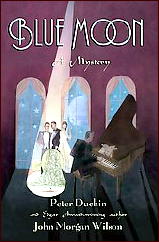Wed 26 Dec 2012
Archived Review: PETER DUCHIN & JOHN MORGAN WILSON – Blue Moon.
Posted by Steve under Reviews[3] Comments
PETER DUCHIN & JOHN MORGAN WILSON – Blue Moon. Berkley, paperback reprint; 1st printing, November 2003. Hardcover first edition: Berkley, 2002.

Peter Duchin, son of famed pianist and bandleader Eddie Duchin, is a bandleader of some renown himself, so when he sits down to play — well, in this case, write a mystery — it certainly comes as no great surprise that his leading protagonist is Philip Damon, famed pianist and bandleader, and son of Archie Damon, leader of one of the most famous high society orchestras of the 30s.
Write what you know, they always say, and it’s obvious all the way through this name-dropping debut murder mystery novel that Peter Duchin knows whereof he writes. Aided and abetted by his Edgar-winning co-author, John Morgan Wilson, they together turn in a nicely tuned performance.
The Edgar, by the way, was for a book entitled Simple Justice, the first in Wilson’s noirish Benjamin Justice series, of which there are now five:
Simple Justice, 1996. [Edgar award, best first mystery]
Revision of Justice, 1997.
Justice at Risk, 1999. [Lambda award, best mystery]
The Limits of Justice, 2000. [Lambda award]
Blind Eye, October 2003.
The Justice series is, from what I’ve heard, rather tough and not for the faint of heart, but in Blue Moon, everything is frothier and very much light-hearted. As bubbly (in an early 1960s high society sense) as a murder mystery can get, you might almost say. The name-dropping begins in earnest on page two, and continues throughout the book.

Appearing on various occasions, many with speaking parts are: Jackie Kennedy, Truman Capote, George Plimpton, Joseph Kraft (and on the west coast) Joe DiMaggio, Herb Caen, Cary Grant, Kim Novak, Carol Channing, Alfred Hitchcock, Willie Mays, Melvin Belli, Dizzy Gillespie, Bill Cosby, Woody Allen, Clint Eastwood, Nina Simone, Gerry Mulligan, and I probably left out many others.
Nothing like hobnobbing with the stars. And there’s also nothing like the sit-up-and-say-oh-my-gosh effect that occurs on page 35 when the ballroom suddenly goes black, a scream rings out, and when the lights go back on, there is a body lying dead on the floor. When was the last time I read this happening? Ever? Did it happen only in the movies? Someone with a better memory than I will have to come up with the answer.
Damon’s own person demons (sorry, I couldn’t help myself) are also at work here. His wife, to whom he was married only three blissful years, was murdered two years earlier, and the case was never solved. Somehow the two deaths are connected, but how? Not trusting the abilities of a black homicide detective named Hercules Platt, whose name should remind you of some other famous detective, but I digress, Damon decides to do some amateur sleuthing on his own.
More deaths occur, and Platt proves himself worthy enough to be invited for an encore, both in an upcoming second pairing, Good Morning, Heartache (Berkley, 2003) and on stage, as Platt (surprisingly) has his own amateur sideline as an after-hours and more than competent jazz saxophonist. The detective work is more melodramatic in the closing than I’d prefer, but the period (a mere 40 years ago) is well-evoked, and the overall ambiance is suave, sophisticated and easy going down.
[UPDATE] 12-26-12. Two additional Benjamin Justice novels published since this review was written are Moth And Flame (2004), and Rhapsody in Blood (2006). There seems to have been only the two books in the collaborative Philip Damon series.
December 26th, 2012 at 11:14 am
A dissenting opinion about Wilson’s toughness: I read SIMPLE JUSTICE and thought it naive. It’s imbued with the “sensitive gay male” world view which comes off as phoney. The book is a paean to a PC Rainbow Coalition which really doesn’t exist. Far from being gritty or tough or real it’s more akin to an urban fairy tale depicting a world in which a small group of “minorities” work together in a sheltered microcosm against the larger world of bigots and ruthless Machiavellians. The mystery plot is transparent, the villain obvious, and the ending laughably bad. I still can’t believe it won an Edgar. Wilson may have improved over time but his debut was too poor for me to read any more of his work. For genuine gay toughness I suggest John Peyton Cooke and James Robert Baker who wrote books much darker, more angry, and more original.
December 26th, 2012 at 11:38 am
Once in a while a book that I might read wins an Edgar, but all in all, I think the various MWA committees are looking for different things than I am.
December 27th, 2012 at 7:02 am
“Blue Moon” could be a nice supplement for my “music and crime”-books collection. The prices of this book are rather low.